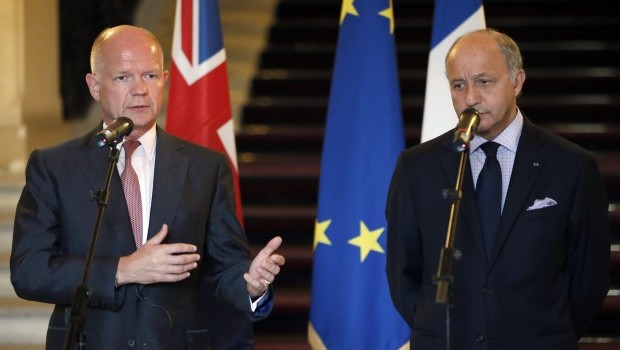After months of buildup, softening of public opinion and clear political support for the Syrian opposition, the United Kingdom and France have spent the past two months engaged in furious backpedalling. For months, diplomats from the Foreign Office and the Quai d’Orsay, under clear political instructions, had tried their best to convince their European partners that the final bastion of authoritarian dictatorship in the Middle East, the Assad dynasty, could be shaken from power by a combination of diplomatic unity and on-the-ground brute force. It would be Libya all over again, but without the bad bits.
Even as the casualties rose to the 100,000 mark and refugee numbers swelled into the millions, British foreign secretary William Hague was not to be dissuaded from making increasingly vociferous calls for the overthrow of the Assad regime.
The truth is that the campaign by Britain and France was a diplomatic failure. It culminated at the end of May, when the two countries alone vetoed the extension the European Union arms embargo on Syria. The rest of Europe wanted nothing to do with it.
It wasn’t meant to be like this. As the United States agreed to provide lethal military assistance to the rebels—in response to allegations that the Assad regime had used chemical weapons against its opponents—Prime Minister David Cameron put official policy into reverse, saying in mid-June that Britain had taken “no decision” to arm the rebels.
The G8 Summit a few days later added to the confusion, with both Hague and Cameron telling the assembled world leaders that they had a duty to protect the rebels from being “exterminated.” Their problems were compounded when London mayor—and potential rival for the Conservative Party leadership—Boris Johnson publicly declared that Britain could not end the conflict by “pressing weapons into the hands of maniacs”—i.e., the rebels. Johnson’s intervention showed just how the issue of Syria has divided the governing party.
But even the Americans were getting cold feet over the scale of the intervention in Syria. Having facilitated the delivery of millions of dollars’ worth of weapons from Qatar and Saudi Arabia into southern Turkey to help arm the rebels and sent ‘advisers’ to train raw recruits, Obama baulked at the idea of a US-enforced no-fly zone, a policy supported by pro-Israeli hawks in Washington. Russia’s President Putin made it very clear that his country would supply advanced S-300 anti-aircraft missiles to Assad and would not back away from its treaty obligations to Syria.
Reading between the lines, it is clear that there has been a major reassessment of Syrian policy in both Washington and London. Wiser counsel has prevailed. Someone, presumably in the intelligence services, finally noticed the obvious, namely that the most effective fighters in Syria against the Assad regime—the radical Islamists—are precisely the people who will not stop once they have ‘liberated’ Damascus. Nor will they thank the West for providing them with the arms and the money to do it.
The April decision by the leadership of the Al-Nusra Front to pledge allegiance to Al-Qaeda was probably a pivotal event. A YouTube clip of a Syrian jihadist allegedly eating the liver of one of his victims probably didn’t help too much, either. Then someone noticed that hundreds of European jihadists were flocking to Syria to join the battle. Evidence emerged that it was not just Assad’s troops who were alleged to have used chemical weapons, but that stocks of the deadly gases may have fallen into the hands of the followers of Al-Qaeda leader Ayman Al-Zawahiri.
Behind all this are even bigger issues. Syria’s alliance with Iran has seen thousands of Lebanese Shi’ite fighters cross the border to take on the mostly Sunni rebels and inflict serious defeats on them, particularly at Homs. The instability of the uprising is now spreading rapidly to Lebanon itself, a tinderbox likely to explode at the slightest provocation.
And just who will benefit from the overthrow of Assad? The Qataris, who have sunk more than USD 3 billion into the rebels, are anxious to prevent Iran from building a new pipeline across Syria to the Mediterranean to export its oil and gas to Europe. Should we worry about such issues? Should we worry about the instability the conflict is creating in Turkey, where a restive Kurdish minority is looking nervously at the fate of the Kurds in Syria? Already, Iraqi Kurds have vowed to defend their brothers in Syria if they are further threatened by Al-Qaeda-linked fighters.
And what about Iran? Under President Ahmadinejad, Iran was an unpredictable, rabble-rousing state, constantly threatening Israel and America. But with a new president making conciliatory noises and apparently looking to mend fences with the West, is this the right time to crush one of his allies?
In the heart of government, Britain and France have undoubtedly taken stock of the realities on the ground in Syria and decided that caution is the watchword. Have they betrayed the Syrian people? I doubt it very much. Few in Syria would thank the West for setting alight the Sunni–Shi’ite dispute and playing midwife to yet another Al-Qaeda franchise.
The counterpoint to this piece can be read here
